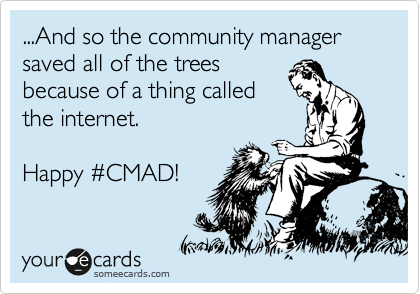 By Shannon DiGregorio Abram, Relationship Manager at The Community Roundtable.
By Shannon DiGregorio Abram, Relationship Manager at The Community Roundtable.
Another January in the books! The first month of 2014 flew by (personal note: I did get married and honeymoon this month, which probably helped the time move fast for me!) and our first experiment with themed content was a great learning exeperience. I really enjoyed sharing ideas and content around the theme of “Building Community” – next month we’re tackling the idea of “Connect” and I can’t wait to see what the month will bring!
This week there were two pretty big events on our radar #CMAD (Community Management Advancement Day) and the IBM Connect event in Orlando, FL. Both provided a wealth of really great content we want to share so the link list is extra long today.
- A fun list of the top 100 Community Managers on Twitter
- The first in our new Faces of Community Management profile series
- A growing list of community manager books.
- Should you give thanks (or a bonus?) to your community manager?
- Community Manager: Key to the Future of Business
- How to Truly Show Your Online Community Manager Appreciation
- Redefining management in the Digital Age
- Social Technologies: A Catalyst to the Practice of Knowledge Management
- Social Media Salary Guide – Infographic
- Social Business Myth Busters from Sandy Carter!
- Really great advice on approaching people who are smarter, busier, and more important than you
- 24 Community Management Tips from the Experts
- Why All Community Managers are Improv Artists
- Online Community ROI, Redefined (In Pictures)
Wow that’s a lot of links! We also launched the survey for our 2014 State of Community Management Report this month. If you haven’t taken it yet we’d love your input – we’re looking for community folks from every size company in every stage of the community journey. You can take the survey here. Thank you in advance for your help.
Have a great Superbowl weekend – I’ve got big plans that involve some homemade kettle corn and watching the game (and the commercials!) with friends. I’ll see you in February!






![Reblog this post [with Zemanta]](https://img.zemanta.com/reblog_e.png?x-id=6fbcd936-c69a-4f5d-87b7-dc5a56918689)
